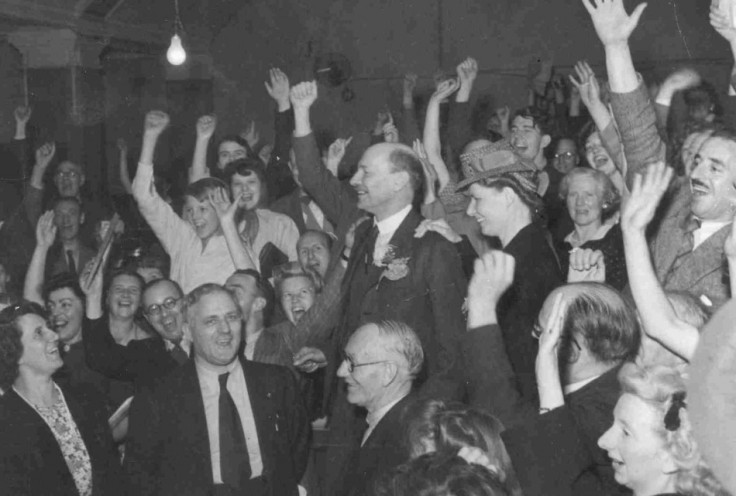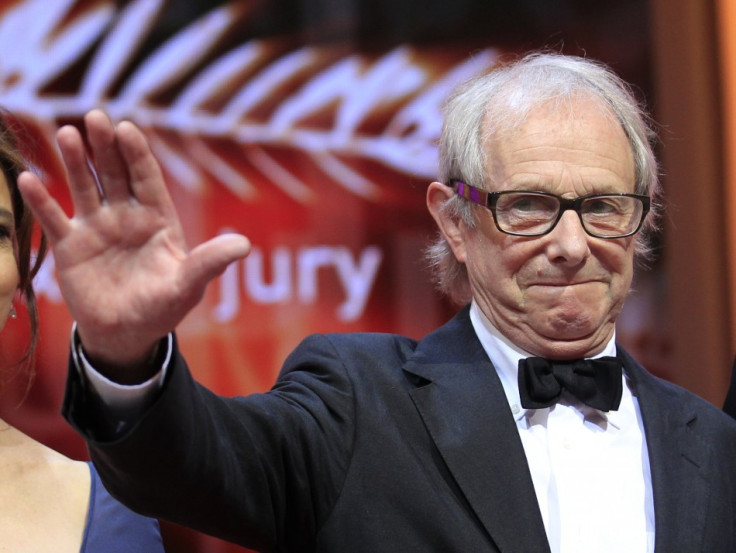Ken Loach: We Need the Spirit of ’45 to Return
Acclaimed political filmmaker talks to IB Times UK about his celebration of the welfare state

"Victory in war must be followed by a prosperous peace". That was the first line of the Labour party's radical manifesto that propelled it to a landslide victory in the 1945 UK general election. Coming off the back of a gruelling but ultimately victorious world war, over the next five years the party laid out its grand plans for full employment, a National Health Service and public ownership of the country's most important industries.
The optimistic birth of nationalisation and the welfare state is lovingly captured in Ken Loach's dazzling new documentary The Spirit of '45. Using archive footage as well as interviews with those who lived through these remarkable changes, the acclaimed political filmmaker issues a clarion call for the nation to once more unite behind establishing a fairer society. The 76-year-old spoke to IB Times UK about the differences between then and now.
"What we had then had been a cathartic experience going to war. People came back with a very simple determination not to repeat the mistakes of the 30s, and great relief at having survived for those that did survive, and build a better world," he says.
The History of Ordinary People
Loach, most well-known for his dramas such as Kes, Cathy Come Home and The Wind That Shakes the Barley, returned to the documentary medium for charting this key period in British history. As well as the extraordinary archive footage of people celebrating the end of war and revelling in the nation's new-found optimism, the film is also populated with numerous talking heads from those affected by Labour's radical policies as they were growing up.
"I thought it would be good to get those memories on film. The people that lived through it are in their mid-80s or even older, so if you wanted to capture their memories it had to be done quite quickly. And also the archive footage is interesting and echoes what their memories are," says Loach.
Aside from some doctors' and the prominent politician Tony Benn, the majority of these talking heads come from people who grew up in impoverished conditions, nostalgically reminiscing over how the welfare state changed their lives for the better. The director explained that this way of recounting history is more valuable than what any historian can provide.
"I like the idea of the history of ordinary people, so then it becomes like a people's history, and I don't like the idea of someone standing in front of camera and telling you what to think. I think it's much more interesting that you get the story through this sort of pattern of memory," he says.
Austerity Britain
These memories have long since faded over the past 70 years as the achievements of Clement Attlee's post-war Labour government have slowly been reversed. The Conservatives under Margaret Thatcher wholly embraced privatisation, as piece by piece state monopolies such as telecom, energy and the railways were sold off.
Before its 1997 landslide win, New Labour under Tony Blair had already voted two years before to cut out the clause in the party's constitution that they would provide a commitment to "the common ownership of the means of production," thus ensuring that privatisation was now adopted by all mainstream political parties in the country.
Under the austerity measures of the current Conservative-Liberal Democrat coalition, Britain faces the prospect of a generation of stagnant living standards. 2.5 million people are currently out of work, with average earnings growth at 1.4 per cent, well below the 2.7 per cent inflation rate. After last year's NHS reforms, and with the government currently planning further cuts to welfare benefits, Loach fears that life will only get worse for those on the margins of society.
"I think we are seeing the last gasps of what the labour government did, and the NHS for example will be gone if we allow the present attacks to continue. The idea of a humane society where people were cared for and all could contribute to, is going, because we've had mass unemployment for so long, and the benefits that people have are being cut and cut again. So I think that humane, tolerant, generous ideas are being squeezed out by a political creed that is all united to obliterate them," says Loach.

A New Left
The disenfranchisement with the main political parties in the UK recently saw the right-wing Ukip achieve second place in the Eastleigh by-election. Loach calls for a similar reactionary movement from the left, taking the rise of parties such as Syriza in Greece as inspiration.
"In Greece for example the main left party [Syriza] has gone from being a tiny party to being supported by nearly half the people. So their experience, which has been more extreme than ours, has revived the spirit of working together, and support for a party that is a socialist party," he notes.
Whilst the popularity of Syriza and other left-wing European parties has come as reaction to the harsh cuts implemented by various nations across the EU, Loach feels that people are more likely to become politically motivated when the issues in the country affect them on a local and personal level.
"It comes out of individual struggles, like there was a big demonstration about the Lewisham Hospital. That gets people motivated. There was a big demonstration about the Whittington Hospital, where they wanted to sell off a whole part and sack 500 staff," he says.
"What motivates people is a specific battle, particularly in their locality. And it's out of that you can build an alternative."
Coming Together
This is an idea that has been the cornerstone of Loach's work. From following a local band of communists fighting for the republicans in the Spanish Civil War in Land and Freedom, to telling the story of five former British Rail workers adapting to working for a private company in The Navigators, the director has always focused on the individual struggles of ordinary people to highlight his political views. The problem he says is for these individuals to group together once more in the hope of bettering society.
"The question is whether these attacks are harsh enough to jolt people out of being disconnected to politics to being connected, and saying 'we've had enough'. There's a lot of campaigns, there's a lot of energy in opposing it. If all that could come together, then we're in with a chance."
Despite his many years of making films to challenge the establishment, the director remains optimistic that in the face of deep and painful cuts to their livelihoods, the public will once again embrace social reform. Now thanks to his documentary, the post-war unifying spirit in 1945 of creating an equal and fair society in Britain will not be forgotten.
The Spirit of '45 is released in cinemas across the UK from 15 March
A UK-wide satellite simulcast with Q&A featuring Ken Loach in conversation with author Owen Jones, comedian Jeremy Hardy and NPC general secretary Dot Gibson will take place on 17 March
© Copyright IBTimes 2025. All rights reserved.






















